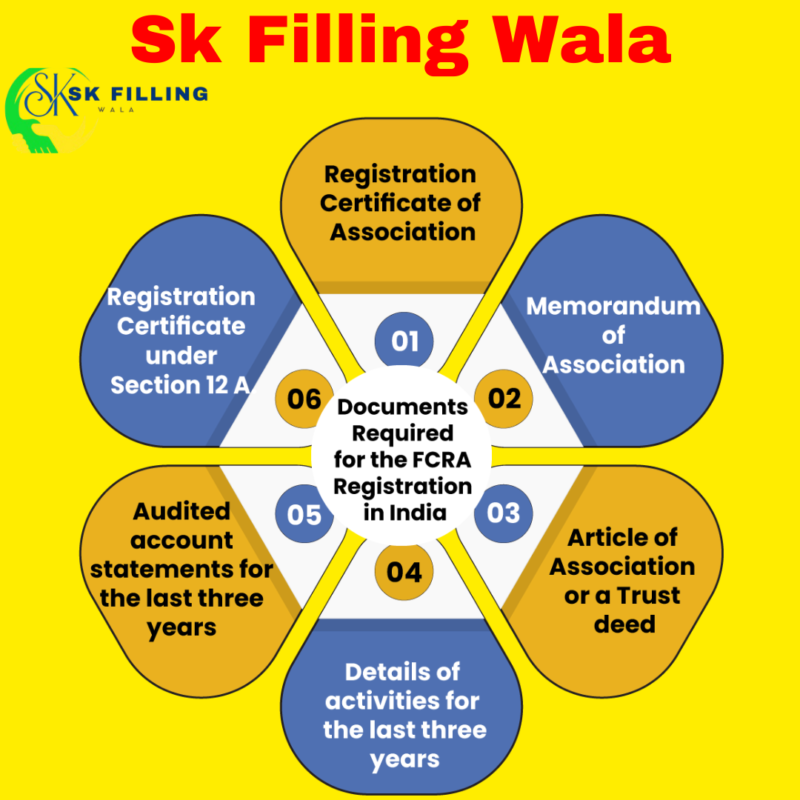FCRA Registration: Process Fees Requirements Eligibility
FCRA registration process enables charitable groups to receive foreign donations. It also helps build trust with donors and stakeholders. The process of applying for an FCRA certificate can be complicated, however.
To begin the process, NGOs must first access the online FCRA portal. After logging in, they must click on either Form FC-3A or FC-3B.
Process
If a non-profit organization wants to receive foreign contributions, it must apply for FCRA registration. This is a process that involves verification and scrutiny by the Ministry of Home Affairs (MHA). In addition, the organization must have charitable objectives that are intended to serve society. These can include promoting health, education, economic development, art, culture, religion, and sports. Those who wish to apply for registration can do so through the FCRA online portal. Once registered, they will be able to receive foreign donations without restrictions. FCRA registration process
The application requires a self-attested copy of the incorporation certificate, trust deed, or other relevant document. It must contain details of the entity, including its PAN number. A certified copy of the MOA and AOA must also be provided. The application must also contain the Chief Judicial Officer’s impression, which should be in a JPG format. Additionally, a comprehensive report on the entity’s activities is required.
In order to qualify for FCRA registration, the organization must have spent at least Rs. 10,00,000 excluding administrative expenses on its objectives in the past three years. In addition, it must have a separate bank account for receiving foreign donations. It must also be audited by a qualified chartered accountant every year. The government will then verify these documents and approve the application.
After the MHA approves the application, it will send the organization a permanent approval certificate (PRC) that is valid for five years. The PRC is granted only to organizations that have shown a track record of complying with the regulations. Moreover, the organization must agree to not engage in any activity that may incite an offense or endanger the physical safety of any person.
An organization can also seek prior permission from the MHA to receive foreign funds for a specific project. This method is useful for new organizations that cannot meet the three-year requirement. Once the MHA grants prior permission, the entity can spend the foreign funds for the specified purpose. It is important to note that the MHA will reserve the right to cancel an organization’s FCRA registration if it violates its regulations.
Fees
An entity receiving foreign contributions for a cultural, economic, educational, religious, or social program must either have FCRA registration or prior permission from the Ministry of Home Affairs. However, there are certain exceptions to this rule. For example, entities whose activities are directly linked to national security or government projects can apply for prior permission. In addition, public servants are prohibited from receiving foreign donations.
The application process for FCRA registration or prior permission involves several steps. Firstly, the entity must submit a self-attested copy of its incorporation certificate or trust deed. In addition, the application must provide detailed financial statements of the previous three years. These include profit and loss accounts, income-expenditure details, and cash flow statements. Furthermore, the applicant must also provide copies of its governing body resolutions.
Moreover, the governing body must agree to adhere to the rules and regulations set by the Ministry of Home Affairs. Furthermore, the entity must have charitable objectives and must have been in operation for a minimum of three years. Additionally, the entity must have a track record of significant accomplishments and achievements in its field of work.
Once the form is submitted, the Ministry of Home Affairs will assess the application and verify its documents. After approval, the entity can then open an FCRA account. Additionally, the entity must submit annual returns to the ministry of home affairs. This return must cover the entire fiscal year and include a certified statement of receipts and payments from a chartered accountant.
A non-profit organization must also file quarterly returns if it receives more than Rs 1 crore in foreign donations. These returns must be filed using Form FC-4. The returns must be filed within six months of the financial year-end. If the entity fails to file the return, it could be subject to fines of up to five times the value of the misappropriated foreign funds. The returns must be filed using the FCRA online portal.
Requirements
FCRA is a law that governs the receipt of foreign funds by non-profit organizations in India. In order to comply with the law, organizations must register as an FCRA entity and receive prior approval before receiving any foreign contributions or government aid. These entities must also have a bank account and follow a regular audit by a certified accountant to ensure that they are using their funds properly. Additionally, the entity must report any misuse of funds to the Home Ministry.
To qualify for registration, an organization must have charitable objectives and a desire to serve the public in general. These goals may include promoting health, education, economic development, art, culture, religion, or sports. The organization must also be registered under Section 12AB of the Income Tax Act, which grants tax exemption to charities. Additionally, the organization must not engage in activities that go against national interests or the sovereignty of India.
The process of registering an NGO under the FCRA is simple and requires only a few steps. First, the organization must create a username and password to access the application form online. Once the user has logged in, they can begin the new registration procedure by clicking on FC-3. Then, they can start filling out the application form and uploading scanned copies of documents.
Applicants should make sure that their application is filled out completely and accurately before submission. Any errors could result in the rejection of their application. Additionally, applicants should avoid making any changes to their application after it has been submitted.
If you’re looking for a reliable and professional service to help you with your FCRA registration, contact us today. Our business specialists can guide you through the process and provide you with all of the support you need. FCRA registration process
Compliance
The Foreign Contribution Regulation Act (FCRA) requires nonprofits to abide by stringent rules and regulations in order to receive foreign contributions. The law requires that organizations submit annual returns, post quarterly reports on their websites, and maintain separate books of accounts for receipts and disbursements. Additionally, they must appoint an authorized agent and agree to accept funds only through designated banks. If an organization fails to comply with these requirements, it may face fines and penalties.
The law is enforced by the Ministry of Home Affairs (MHA) and is intended to protect the interests of the public. The MHA verifies and scrutinizes the submitted documents before granting a Permanent Registration Certificate (PRC) to NGOs. The MHA also has the authority to inspect and assess the organization’s activities.
NGOs must be registered under the Societies Registration Act of India to be eligible for FCRA registration. They must also be operational for a minimum of five years and have spent at least Rs. 10 lakh on achieving their main objectives. They must also submit financial statements for the last three years, which have been audited by a qualified Chartered Accountant.
Compliance with FCRA regulations is vital to the success of your NGO. If you’re not in compliance, the MHA can ban your NGO from receiving foreign donations and fine you for violations. In addition, you could lose access to tax benefits and potentially be banned from operating in the future. FCRA registration process
In order to ensure compliance, you should hire a skilled attorney. They can help you navigate the complex legal nuances of FCRA and help you make informed decisions about your business. Additionally, they can help you implement processes that ensure compliance with the law.
The 2020 amendment to the FCRA imposes stricter regulations on foreign contribution transfers and makes it mandatory for all donors to submit their Aadhaar details. It also prohibits transferring funds to private individuals and imposes stricter controls on administrative expenses. These changes will enhance transparency and ensure compliance with the law. The introduction of the FCRA transaction code in RTGS and NEFT will further strengthen these measures, making it even easier to comply with FCRA laws.

